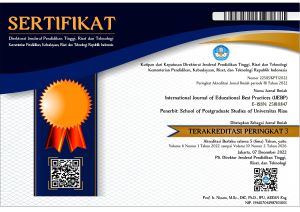ENHANCING STUDENT SATISFACTION IN ONLINE DISTANCE LEARNING: DEVELOPMENT OF THE E-QUALS MODEL FOR SERVICE QUALITY ASSESSMENT
DOI:
https://doi.org/10.31258/ijebp.9.1.1-23Keywords:
Service Quality, Student Satisfaction, Online Distance LearningAbstract
Higher education service quality is a key factor in shaping student satisfaction. The era of rapidly developing technology has given birth to various innovations in the world of higher education, one of which is online distance education. These innovations must be supported by high quality services, which directly impact student satisfaction. A systematic literature review on research that examines the service quality factors of Online Distance Learning Universities from various countries will obtain a model of service quality factors in shaping student satisfaction in Online Distance Learning Universities. The purpose of this research is to identify and analyze significant service quality factors in shaping student satisfaction in Online Distance Learning Universities. In addition, this study also developed a conceptual framework in the form of a service quality model for student satisfaction in the context of distance higher education. The method used uses a qualitative approach, with the type of PRISMA (Preferred Reporting Items, for Systematic Review and Meta Analyses). The results of this study reveal that student satisfaction with service quality in Online Distance Learning Universities is influenced by various factors of service quality namely e-learning system quality, course design and content, support services, interaction, teaching & Instructor quality, and technology resources & infrastructure. The result of the research is the E-QUALS model which is a theoretical framework modeling the dimensions of service quality factors that shape student satisfaction in Online Distance Learning Universities.
References
Abdullah, M. N. L. Y., Fen, T. S., Samsudin, M. A., Ying, S. T., & Yuan, F. C. (2024). Factors influencing undergraduate students’ online learning outcomes: A structural equation modeling. SAGE Open, 14(2). https://doi.org/10.1177/21582440241261834
Abuhassna, H., Al-Rahmi, W. M., Yahya, N., Zakaria, M. a. Z. M., Kosnin, A. B. M., & Darwish, M. (2020). Development of a new model on utilizing online learning platforms to improve students’ academic achievements and satisfaction. International Journal of Educational Technology in Higher Education, 17(1). https://doi.org/10.1186/s41239-020-00216-z
Agyeiwaah, E., Baiden, F. B., Gamor, E., & Hsu, F. (2021). Determining the attributes that influence students’ online learning satisfaction during COVID-19 pandemic. Journal of Hospitality Leisure Sport & Tourism Education, 30, 100364. https://doi.org/10.1016/j.jhlste.2021.100364
Aheto, S. K., Barfi, K. A., Kwesi, C., & Nyagorme, P. (2024). Relationships between online self-regulation skills, satisfaction, and perceived learning among distance education learners. Heliyon, 10(8), e29467. https://doi.org/10.1016/j.heliyon.2024.e29467
Albanyan, A. M. (2024). The quality of distance learning during COVID-19: Perspectives of Saudi University students. Heliyon, 10(13), e33731. https://doi.org/10.1016/j.heliyon.2024.e33731
Ali, M., Puah, C., Fatima, S., Hashmi, A., & Ashfaq, M. (2022). Student e-learning service quality, satisfaction, commitment and behaviour towards finance courses in COVID-19 pandemic. International Journal of Educational Management, 36(6), 892–907. https://doi.org/10.1108/ijem-04-2021-0133
Amoush, K. H., & Mizher, R. A. (2023). Interaction as a predicator for EFL undergraduate university students’ satisfaction with online English language courses. Theory and Practice in Language Studies, 13(4), 927–937. https://doi.org/10.17507/tpls.1304.14
Bossman, A., & Agyei, S. K. (2022). Technology and instructor dimensions, e-learning satisfaction, and academic performance of distance students in Ghana. Heliyon, 8(4), e09200. https://doi.org/10.1016/j.heliyon.2022.e09200
Bouranta, N., Psomas, E. L., & Kafetzopoulos, D. (2024). Integrating online learning into service quality assessment in higher-education its influence on student satisfaction. The TQM Journal. https://doi.org/10.1108/tqm-06-2023-0180
Chetioui, H., Lebdaoui, H., Adelli, O., Bendriouch, F. Z., Chetioui, Y., & Lebdaoui, K. (2024). An investigation of university students’ attitude, satisfaction and academic achievement in online learning: empirical evidence from a developing nation. Journal of Applied Research in Higher Education. https://doi.org/10.1108/jarhe-05-2023-0207
Chung, J., McKenzie, S., Schweinsberg, A., & Mundy, M. E. (2022). Correlates of academic performance in online higher education: A systematic review. Frontiers in Education, 7. https://doi.org/10.3389/feduc.2022.820567
Dangaiso, P., Makudza, F., & Hogo, H. (2022). Modelling perceived e-learning service quality, student satisfaction and loyalty. A higher education perspective. Cogent Education, 9(1). https://doi.org/10.1080/2331186x.2022.2145805
Darawong, C., & Widayati, A. (2021). Improving student satisfaction and learning outcomes with service quality of online courses: Evidence from Thai and Indonesian higher education institutions. Journal of Applied Research in Higher Education, 14(4), 1245–1259. https://doi.org/10.1108/jarhe-02-2021-0074
Ferdousi, F., Ahmed, A. and Momen, M.A. (2022). Evolution of quality assurance practices in enhancing the quality of open and distance education in a developing nation: A case study. Asian Association of Open Universities Journal, 17 (2), 147-160. https://doi.org/10.1108/AAOUJ-02-2022-0025
Jiménez-Bucarey, C., Acevedo-Duque, Á., Müller-Pérez, S., Aguilar-Gallardo, L., Mora-Moscoso, M., & Vargas, E. C. (2021). Student’s satisfaction of the Quality of online learning in Higher Education: An empirical study. Sustainability, 13(21), 11960. https://doi.org/10.3390/su132111960
Khan, E. A., Cram, A., Wang, X., Tran, K., Cavaleri, M., & Rahman, M. J. (2023). Modelling the impact of online learning quality on students’ satisfaction, trust and loyalty. International Journal of Educational Management, 37(2), 281–299. https://doi.org/10.1108/ijem-02-2022-0066
Kornpitack, P., & Sawmong, S. (2022). Empirical analysis of factors influencing student satisfaction with online learning systems during the COVID-19 pandemic in Thailand. Heliyon, 8(3), e09183. https://doi.org/10.1016/j.heliyon.2022.e09183
Kotler, Philip & Keller K.Lane (2006). Marketing Management (12th ed. Prentice Hall.
Kulal, A., Dinesh, S., Abhishek, N., & Anchan, A. (2024). Digital access and learning outcomes: a study of equity and inclusivity in distance education. International Journal of Educational Management, 38(5), 1391–1423. https://doi.org/10.1108/ijem-03-2024-0166
Lamé, G. (2019). Systematic literature reviews: An introduction. Proceedings of the . . . International Conference on Engineering Design, 1(1), 1633–1642. https://doi.org/10.1017/dsi.2019.169
Latif, L. A., Bahroom, R., & Khalil, M. a. K. M. (2016). Prioritizing services and facilities in a higher education institution. AAOU Journal/AAOU Journal, 11(1), 64–77. https://doi.org/10.1108/aaouj-07-2016-0020
Li, Y. (2024). Exploring impacting factors of undergraduate students’ satisfaction with online courses of adult higher education in Chengdu. AU-GSB E-JOURNAL, 17(1), 171-180. https://doi.org/10.14456/augsbejr.2024.17
Limbu, Y. B., & Pham, L. (2023). Impact of e-learning service quality on student satisfaction during the Covid-19 pandemic: A systematic review. Knowledge Management & E-Learning, 15(4), 523–538. https://doi.org/10.34105/j.kmel.2023.15.030
Littlefield, M. B., Rubinstein, K., & Laveist, C. B. (2019). Designing for quality: Distance education rubrics for online MSW programs. Journal of Teaching in Social Work, 39(4–5), 489–504. https://doi.org/10.1080/08841233.2019.1658691
Lovelock, C. H., & Wright, L. (1999). Principles of service marketing and management. Prentice Hall.
Makoe, M., & Nsamba, A. (2019). The gap between student perceptions and expectations of quality support services at the University of South Africa. American Journal of Distance Education, 33(2), 132–141. https://doi.org/10.1080/08923647.2019.1583028
Mattah, P. A. D., Kwarteng, A. J., & Mensah, J. (2018). Indicators of service quality and satisfaction among graduating students of a higher education institution (HEI) in Ghana. Higher Education Evaluation and Development, 12(1), 36-52. https://10.1108/HEED-10-2017-0006
Momen, M. A., Sultana, S., Hoque, M. A., Shahriar, S. H. B., & Ashif, A. S. M. (2023). Determinants of students’ satisfaction with digital classroom services: Moderating effect of students’ level of study. AAOU Journal/AAOU Journal, 18(2), 160–175. https://doi.org/10.1108/aaouj-09-2022-0124
Mulhem, A. A. (2020). Investigating the effects of quality factors and organizational factors on university students’ satisfaction of e-learning system quality. Cogent Education, 7(1). https://doi.org/10.1080/2331186x.2020.1787004
Nikou, S., & Maslov, I. (2022). Finnish university students’ satisfaction with e-learning outcomes during the COVID-19 pandemic. International Journal of Educational Management, 37(1), 1–21. https://doi.org/10.1108/ijem-04-2022-0166
Nyoko, A. E. L., & Hanafiah, M. H. (2024). A systematic literature review on entrepreneurial intention: PRISMA method. In Advances in economics, business and management research/Advances in Economics, Business and Management Research (pp. 254–273). https://doi.org/10.2991/978-94-6463-411-2_21
Parasuraman, A., Zeithaml, V. A., & Berry, L. L. (1988). Servqual: A multiple-item scale for measuring consumer perc. Journal of retailing, 64(1), 12. Retrieved from https://www.proquest.com/scholarly-journals/servqual-multiple-item-scale-measuring-consumer/docview/228609374/se-2
Parasuraman, A., Zeithaml, V. A., & Malhotra, A. (2005). ES-QUAL: A multiple-item scale for assessing electronic service quality. Journal of service research, 7(3), 213-233. http://dx.doi.org/10.1177/1094670504271156
Rabiah, S. (2019). Manajemen Pendidikan tinggi dalam meningkatkan mutu pendidikan. Jurnal Sinar Manajemen, 6(1), 58-67. https://doi.org/10.56338/jsm.v6i1.551
Salman, D., & Soliman, C. (2022). Insights from online education in the Egyptian higher education. International Journal of Educational Management, 37(1), 135–146. https://doi.org/10.1108/ijem-05-2022-0173
Shikulo, L., & Lekhetho, M. (2020). Exploring student support services of a distance learning centre at a Namibian university. Cogent Social Sciences, 6(1). https://doi.org/10.1080/23311886.2020.1737401
Sigiyuwanta, R., Mustiningsih, M., & Nurabadi, A. (2024). Analysis of problems in planning and organizing independent curriculum in madrasah ibtidaiyah: teacher’s perspective. Jurnal Bidang Pendidikan Dasar, 8(2), 163–174. https://doi.org/10.21067/jbpd.v8i2.10113
Supriyanto, A., Burhanuddin, B., Sunarni, S., Rochmawati, R., Ratri, D. K., & Bhayangkara, A. N. (2024). Academic service quality, student satisfaction and loyalty: a study at higher education legal entities in Indonesia. The TQM Journal. https://doi.org/10.1108/tqm-10-2023-0334
Thygesen, H., Gramstad, A., Åsli, L. A., Stigen, L., Magne, T. A., Carstensen, T., & Bonsaksen, T. (2020). Associations between learning environment factors and student satisfaction among occupational therapy students. Irish Journal of Occupational Therapy, 48(2), 91-100. https://doi.org/10.1108/IJOT-10-2019-0015
Tran, V. D. (2022). Perceived satisfaction and effectiveness of online education during the COVID-19 pandemic: the moderating effect of academic self-efficacy. Higher Education Pedagogies, 7(1), 107–129. https://doi.org/10.1080/23752696.2022.2113112
Wang, Y., Wang, H. W., & Albert, L. J. (2023). MOOC relevance: A key determinant of the success for massive open online courses. Journal of Information Systems Education, 34(4), 456-471. Retrieved from https://www.proquest.com/scholarly-journals/mooc-relevance-key-determinant-success-massive/docview/2890076484/se-2
Wani, S. A., Asgar, A., & Srivastava, M. (2023). Learner support services at distance higher education institutions in the union territory of Jammu and Kashmir. AAOU Journal/AAOU Journal, 18(3), 246–261. https://doi.org/10.1108/aaouj-02-2023-0026
Weng, S., & Qin, Y. (2023). Which qualities should build environment possess to ensure satisfaction of higher-education students with remote education during pandemics? Environmental Science and Pollution Research, 30(46), 102504–102518. https://doi.org/10.1007/s11356-023-29118-z
Zouiri, L., & Kinani, F. E. (2022). An analysis of students’ satisfaction with distance learning in Moroccan universities during the COVID-19 pandemic. Public Administration and Policy, 25(3), 293–309. https://doi.org/10.1108/pap-08-2022-0102
Zuhairi, A., Karthikeyan, N., & Priyadarshana, S. T. (2019). Supporting students to succeed in open and distance learning in the Open University of Sri Lanka and Universitas Terbuka Indonesia. AAOU Journal/AAOU Journal, 15(1), 13–35. https://doi.org/10.1108/aaouj-09-2019-0038





